[实用参考]初中英语倒装句练习题.doc
七年级英语倒装句运用练习题30题

七年级英语倒装句运用练习题30题1<背景文章>There was a great event at our school last week. In the schoolyard, here and there were colorful balloons. Not only were the students excited, but also the teachers. Under a big tree, there stood a stage. On the stage, many students were performing. Here came the dancers, dancing gracefully. There went the singers, singing beautifully.The audience was amazed by the wonderful performances. Suddenly, there rang a loud applause. Everyone was having a great time.1. Not only were the students excited, but also the teachers. This is an example of _______.A. normal sentenceB. interrogative sentenceC. inverted sentenceD. exclamatory sentence答案:C。
中文解析:这句话“Not only were the students excited, but also the teachers.”是一个倒装句的例子,所以选C。
2. There stood a stage. The underlined part is _______.A. a subjectB. a predicateC. an objectD. an adverbial答案:A。
初二英语倒装句练习题50题(带答案)

初二英语倒装句练习题50题(带答案)1. Here ______ the bus.A. comeB. comesC. comingD. to come答案解析:B。
完全倒装句中,here、there等副词位于句首时,句子要完全倒装,即谓语动词要放在主语之前。
本句的主语是the bus,是第三人称单数,所以谓语动词用comes。
选项A是动词原形,不符合主谓一致;选项C是现在分词形式,不能作谓语;选项D是不定式形式,也不能作谓语。
2. Out ______ the children when the bell rang.A. rushB. rushedC. to rushD. rushing答案解析:B。
当out等表示方位的副词位于句首时,句子要完全倒装。
句子的主语是the children,是复数形式,所以谓语动词用rushed。
选项A是动词原形,不符合主谓一致;选项C是不定式形式,不能作谓语;选项D是现在分词形式,不能作谓语。
3. On the wall ______ two large portraits.A. hangB. hangsC. hangingD. are hung答案解析:A。
表示地点的介词短语on the wall位于句首时,句子要完全倒装。
句子的主语是two large portraits,是复数形式,所以谓语动词用hang。
选项B是第三人称单数形式,不符合主谓一致;选项C是现在分词形式,不能作谓语;选项D是被动语态形式,这里不需要用被动语态。
4. There ______ a book and two pens on the desk.A. isB. areC. beD. being答案解析:A。
在there be句型中,be动词的形式要根据就近原则来确定。
本句中与be动词最近的是a book,是单数形式,所以be 动词用is。
选项B是复数形式,不符合就近原则;选项C是be动词原形,不能直接用在句中;选项D是现在分词形式,不能作谓语。
初二英语倒装句类型练习题40题(带答案)

初二英语倒装句类型练习题40题(带答案)1.Never have I seen such a beautiful sunset.Only then did I realize the importance of time.Hardly had I arrived home when the phone rang.Scarcely had she finished her work when the boss asked for more.Rarely do people understand the true meaning of friendship.Little did he know that his life was about to change.Nowhere can you find a more peaceful place.Not until he apologized did I forgive him.At no time should you give up.Under no circumstances will I tell a lie.答案解析:以上句子都是以否定副词开头的倒装句。
在这种情况下,句子要部分倒装,即把助动词、be 动词或情态动词提前到主语之前。
例如第一题,正常语序是I have never seen such a beautiful sunset.以否定副词never 开头,把助动词have 提前,变成Never have I seen such a beautiful sunset.第二题正常语序是I realized the importance of time only then.以only then 开头,把助动词did 提前,变成Only then did I realize the importance of time.以此类推。
这些句子的选项只有一个,因为是固定的倒装句式,不存在其他选项的对错原因。
【英语】初中英语倒装句的技巧及练习题及练习题(含答案).docx

A. Neither are weB. Neither do weC. So are weD. So do we
【答案】A
【解析】 【分析】句意:—我 在学校会 上不被允 任何零食和 料。—我 也是。
根据We are not allowed可知此 表示否定,并且助 用are,故表示我 也不被允 ,
---_________________
A. So do I
B. So am I
C. Neither am I
D. Neither do I
【答案】
A
【解析】 【分析】So do I我也一 ;So am I.我也是;Neither am I我也不;Neither do I
我也不。句意:彼得 儿的 多人。 合 境可知上文 一般 在 ,主 构,故A。
某某也不neither +助动词+主语;so +主语+助动词/情态动词/系动词+主语:某某确实如此,与上文是同一人。该句式在时态,人称上与前一个句子相同。上句是肯定句,故选
A。
【点评】考查倒装句。
16. —Will you go to the party tomorrow?
—If you go, ______. If you don't, _______. A. so will I, neither will I
3.句型中助 ,包括 系 和情 的 要和上句中 的 相一致。另一句型so+主+助 是指 上文的肯定,起加 作用。
13. —Jim enjoys listening to pop music.
—_______________.
A. So does Helen.B. Also is HelenC. Helen likes alsoD. So Helen does
七年级英语倒装句运用练习题30题
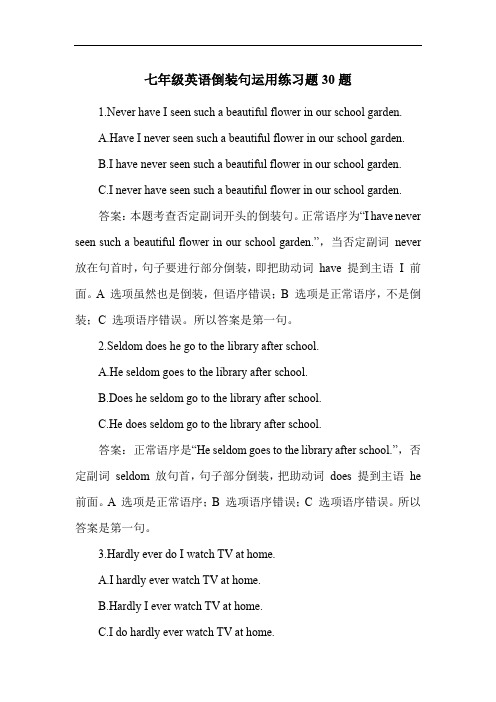
七年级英语倒装句运用练习题30题1.Never have I seen such a beautiful flower in our school garden.A.Have I never seen such a beautiful flower in our school garden.B.I have never seen such a beautiful flower in our school garden.C.I never have seen such a beautiful flower in our school garden.答案:本题考查否定副词开头的倒装句。
正常语序为“I have never seen such a beautiful flower in our school garden.”,当否定副词never 放在句首时,句子要进行部分倒装,即把助动词have 提到主语I 前面。
A 选项虽然也是倒装,但语序错误;B 选项是正常语序,不是倒装;C 选项语序错误。
所以答案是第一句。
2.Seldom does he go to the library after school.A.He seldom goes to the library after school.B.Does he seldom go to the library after school.C.He does seldom go to the library after school.答案:正常语序是“He seldom goes to the library after school.”,否定副词seldom 放句首,句子部分倒装,把助动词does 提到主语he 前面。
A 选项是正常语序;B 选项语序错误;C 选项语序错误。
所以答案是第一句。
3.Hardly ever do I watch TV at home.A.I hardly ever watch TV at home.B.Hardly I ever watch TV at home.C.I do hardly ever watch TV at home.答案:正常语序是“I hardly ever watch TV at home.”,hardly ever 放句首,部分倒装,助动词do 提到主语I 前面。
【英语】初中英语倒装句题20套(带答案)

【英语】初中英语倒装句题20 套( 带答案 )一、倒装句1.—I haven't seen the interesting movie Let the Bullet(子)Fly.— _________.A. Neither have IB. So have IC. Neither I haveD. So I have【答案】A【分析】【剖析】Neither have I 我也没有; So have I 我也一; Neither I have 我确不;So I have 确是。
句意:我没有不风趣的影《子》。
依据境可知A。
【点】几个倒装句的区比。
“so+助(情或系)+另一主”,此句型是主倒装构,能够表示前面的状况也合用于后者,使用句型需要注意以几个方面的: 1.句型只好用于一定句,不可以用于否认句:假如前句能否认句,要用“neither/ nor +助+主”。
2.句型中的主与上文中的主是不一样的两个主3.句型中助,包含系和情的要和上句中的相一致。
另一句型 so+主 +助是指上文的一定,起加作用。
2.— I think the plan is just a waste of time. What do you think?— Well, if you don't support the plan, ________.A. neither do IB. so do IC. neither will ID. so will I 【答案】C【分析】【剖析】句意:——我个划不过在浪。
您是怎么想的?——好,假如你不支持个划,我也不支持。
Neither+ 助+主,表示主也不是⋯⋯;里是if 引的条件状从句,主句用一般未来,从句用一般在,里是主句,故助用 will 。
依据意,故 C。
【点】考倒装句,注意Neither+ 助+主,表示主也不是;so+助+主,表示主也是。
3.If you go to his party tomorrow,C. don't, neither do ID. /, so do IA. won't, neither do IB. don't, neither will I【答案】B【分析】【剖析】句意:假如你明日不参加他的聚会,我也不去。
初三英语倒装句深度练习练习题20题含答案解析
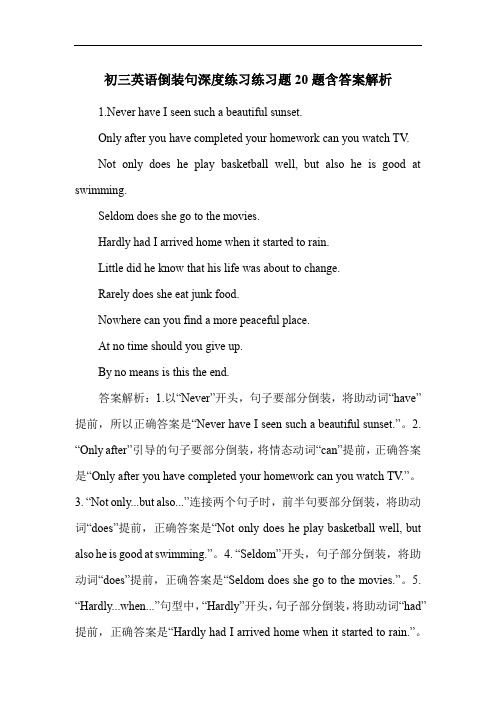
初三英语倒装句深度练习练习题20题含答案解析1.Never have I seen such a beautiful sunset.Only after you have completed your homework can you watch TV.Not only does he play basketball well, but also he is good at swimming.Seldom does she go to the movies.Hardly had I arrived home when it started to rain.Little did he know that his life was about to change.Rarely does she eat junk food.Nowhere can you find a more peaceful place.At no time should you give up.By no means is this the end.答案解析:1.以“Never”开头,句子要部分倒装,将助动词“have”提前,所以正确答案是“Never have I seen such a beautiful sunset.”。
2. “Only after”引导的句子要部分倒装,将情态动词“can”提前,正确答案是“Only after you have completed your homework can you watch TV.”。
3. “Not only...but also...”连接两个句子时,前半句要部分倒装,将助动词“does”提前,正确答案是“Not only does he play basketball well, but also he is good at swimming.”。
4. “Seldom”开头,句子部分倒装,将助动词“does”提前,正确答案是“Seldom does she go to the movies.”。
七年级英语倒装句练习题50题

七年级英语倒装句练习题50题1.Never have I seen such a beautiful campus.A.Seldom have IB.Rarely have IC.Hardly have ID.Sometimes have I答案:C。
本题考查否定副词开头的倒装句。
否定副词never、seldom、rarely、hardly 等位于句首时,句子要部分倒装,即将助动词、be 动词或情态动词提到主语之前。
选项A、B、C 都是正确的倒装形式,选项D 不是倒装形式,所以错误。
本句意思是“我从未见过如此美丽的校园”。
2.Little does he know about the new project.A.Few does heB.Small does heC.Rare does heD.Much does he答案:A。
否定副词little、few 等位于句首时,句子要部分倒装。
选项 A 是正确的倒装形式,选项B、C、D 都不是倒装形式,所以错误。
本句意思是“他对这个新项目知之甚少”。
3.Seldom do we have such a busy day.A.Rarely do weB.Hardly do weC.Often do weD.Never do we答案:B。
seldom、rarely、hardly、never 等否定副词位于句首时,句子部分倒装。
选项A、B、D 都是倒装形式,选项C 不是倒装形式。
often 是肯定副词,不能用于倒装句。
本句意思是“我们很少有这么忙碌的一天”。
4.Hardly had we started the class when the bell rang.A.Scarcely had weB.Rarely had weC.Seldom had weD.Often had we答案:A。
hardly/scarcely...when...表示“一……就……”,位于句首时,句子部分倒装。
初三英语倒装句练习题20题(带答案)
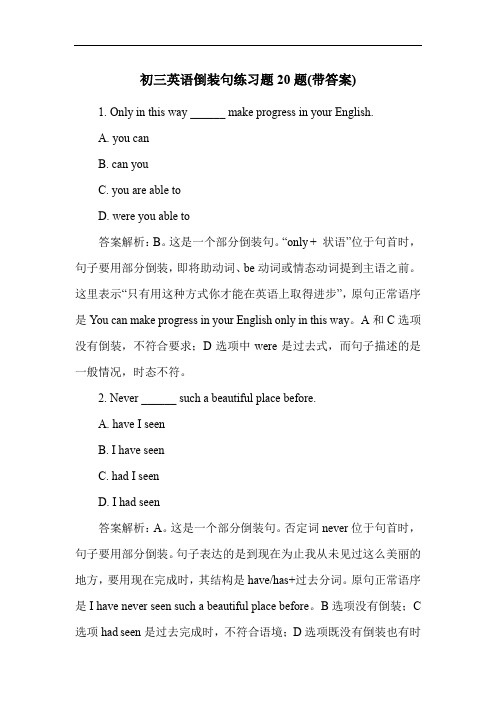
初三英语倒装句练习题20题(带答案)1. Only in this way ______ make progress in your English.A. you canB. can youC. you are able toD. were you able to答案解析:B。
这是一个部分倒装句。
“only + 状语”位于句首时,句子要用部分倒装,即将助动词、be动词或情态动词提到主语之前。
这里表示“只有用这种方式你才能在英语上取得进步”,原句正常语序是You can make progress in your English only in this way。
A和C选项没有倒装,不符合要求;D选项中were是过去式,而句子描述的是一般情况,时态不符。
2. Never ______ such a beautiful place before.A. have I seenB. I have seenC. had I seenD. I had seen答案解析:A。
这是一个部分倒装句。
否定词never位于句首时,句子要用部分倒装。
句子表达的是到现在为止我从未见过这么美丽的地方,要用现在完成时,其结构是have/has+过去分词。
原句正常语序是I have never seen such a beautiful place before。
B选项没有倒装;C 选项had seen是过去完成时,不符合语境;D选项既没有倒装也有时态错误。
3. Here ______ the bus.A. comeB. comesC. comingD. is come答案解析:B。
这是一个完全倒装句。
当表示地点的副词here位于句首时,如果句子的主语是名词,句子要用完全倒装,即谓语动词提到主语之前。
主语the bus是第三人称单数,所以谓语动词用comes。
A选项come没有用第三人称单数形式;C选项coming是非谓语形式,不能作谓语;D选项is come表达错误。
倒装句全面讲解和练习(答案).doc
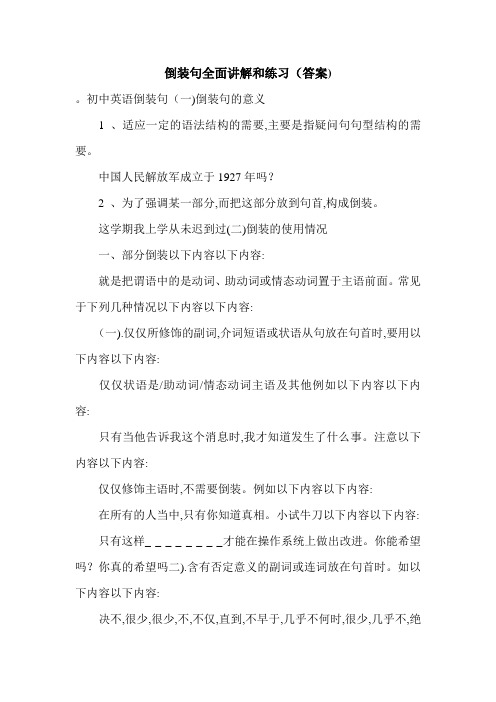
倒装句全面讲解和练习(答案)。
初中英语倒装句(一)倒装句的意义1 、适应一定的语法结构的需要,主要是指疑问句句型结构的需要。
中国人民解放军成立于1927年吗?2 、为了强调某一部分,而把这部分放到句首,构成倒装。
这学期我上学从未迟到过(二)倒装的使用情况一、部分倒装以下内容以下内容:就是把谓语中的是动词、助动词或情态动词置于主语前面。
常见于下列几种情况以下内容以下内容:(一).仅仅所修饰的副词,介词短语或状语从句放在句首时,要用以下内容以下内容:仅仅状语是/助动词/情态动词主语及其他例如以下内容以下内容:只有当他告诉我这个消息时,我才知道发生了什么事。
注意以下内容以下内容:仅仅修饰主语时,不需要倒装。
例如以下内容以下内容:在所有的人当中,只有你知道真相。
小试牛刀以下内容以下内容: 只有这样_ _ _ _ _ _ _ _才能在操作系统上做出改进。
你能希望吗?你真的希望吗二).含有否定意义的副词或连词放在句首时。
如以下内容以下内容:决不,很少,很少,不,不仅,直到,不早于,几乎不何时,很少,几乎不,绝不等。
例如以下内容以下内容:我们很少在早上四点起床.=我们很少在早上四点起床。
他没有一句话能表达他的感情(1)几乎……何时;几乎……当……就在……之前……可以用正常语序我几乎没做什么,但是……做了或用倒装句式几乎没有主语完成于……完成时句式几乎没有。
所在的句子用过去完成时。
例如以下内容以下内容:上课铃刚一响。
上课铃刚一响。
他一到北京就开始工作了(2)不仅……而且如连接两个成分时,不用倒装;连接句子时,前面的句子要用倒装。
例如以下内容以下内容:不仅他所拥有的一切都被夺走了,而且他的德国国籍也被夺走了。
他不仅很忙,我也有很多工作要做。
小试牛刀以下内容以下内容:1.我终于得到了-省略部分他在乎吗?他在乎吗?他在乎吗?嗯,我了解他,也很了解我。
答以下内容:是的。
他做了。
我做了;他做了,我做了;他承认了吗?他44岁。
初中英语2024届中考句法复习倒装句专项练习(附参考答案)

中考英语倒装句专项练习班级考号姓名总分【基础巩固】单项选择。
( ) 1. three orange notebooks.A.Here areB.Here isC.This isD.That is( ) 2. If you take a vacation this summer, so I.A.willB.doC.amD.did( ) 3.Only yesterday find out that his purse was lost.A. he wasB. was heC. did heD.he did( )4.Only at that time that he was wrong.A. he realizedB. did he realizeC. he did realizeD. he did realized( )5.-Zhang Fuqing, once a soldier, often thinks more about others than himself.-A. So he doesB. So does heC.So he isD.So is he( ) 6.My grandma is used to living in the city. -A. So is my grandpaB. So my grandpaC. So my grandpa didD. So did my grandpa( ) 7.-I have never been to Tenglong Cave. -A. Neither do IB. So have IC. Neither have ID.So do I( )8. I must work hard. Only then a chance of achieving my dreams.A.will I haveB. I will haveC.I haveD. have will I( ) 9. Not only French, but knows a little German.A. she knowsB. does she knowC. she does knowD.she know( ) 10.This is not my story, no the whole story. My story plays out differently.A. is thereB. there isC. is itD.it is( ) 11. So suddenly the disease that the whole family were at a great loss.A. did he catchB.he caughtC. was he caughtD.he was caught( )12.-Where is Mrs Chen?-Look,A. there is sheB.there does sheC. there she isD.there she does( )13. This is my book. Look! ! Thank you.A. Here my nameB. Here my name isC. Here is my nameD. Here name is my( ) 14. Listen! Let's get into the classroom!A.There the bell goes!B. There goes the bell!C. The bell goes there!D. Goes the bell there!( )15.I can't play the piano and .A.my sister can't, tooB. neither can my sisterB.C. can my sister, either D. neither my sister can【难点突破】一、单项选择。
初三英语倒装句与强调句练习题30题

初三英语倒装句与强调句练习题30题1<背景文章>Once upon a time, in a small village, there lived a wise old man. Not only was he known for his wisdom, but also for his kindness. In the village, there was a beautiful garden. Only in this garden could one find the most colorful flowers and the sweetest fruits.One day, a young traveler came to the village. Never had he seen such a beautiful place. “What a wonderful village this is!” he exclaimed. Little did he know that his life was about to change.The old man saw the traveler and invited him to his house. There, they talked for hours. “It is kindness that makes a person truly great,” said the old man. “And only by being kind can we make the world a better place.”The traveler was deeply impressed by the old man's words. So much so that he decided to stay in the village and learn from the wise old man.1. Not only was he known for his wisdom, but also for his kindness. 这句话的正常语序是:A. He was not only known for his wisdom, but also for his kindness.B. He was known not only for his wisdom, but also for his kindness.C. He was known for his wisdom not only, but also for his kindness.D. He was known for his kindness not only, but also for his wisdom.答案:B。
初二英语倒装句练习题20题含答案解析

初二英语倒装句练习题20题含答案解析1.Never have I seen such a beautiful sunset.A.Have I neverB.I have neverC.Never I have答案解析:这句话是部分倒装句,否定词never 置于句首,引起句子部分倒装,将助动词have 提到主语I 前面。
A 选项也是部分倒装,与题目一致;B 选项是正常语序,不符合要求;C 选项语序错误。
2.Seldom does he go to the park.A.Does he seldomB.He seldom doesC.Seldom he does答案解析:seldom 置于句首,句子部分倒装,助动词does 提到主语he 前面。
A 选项语序错误;B 选项是正常语序,不符合要求;C 选项语序错误。
3.Hardly had I arrived when it started to rain.A.Had I hardlyB.Hardly I hadC.I had hardly答案解析:hardly 置于句首,句子部分倒装,助动词had 提到主语I 前面。
A 选项语序错误;B 选项语序正确;C 选项是正常语序,不符合要求。
4.Rarely does she eat junk food.A.Does she rarelyB.She rarely doesC.Rarely she does答案解析:rarely 置于句首,句子部分倒装,助动词does 提到主语she 前面。
A 选项语序错误;B 选项是正常语序,不符合要求;C 选项语序错误。
5.Not only does he play basketball well, but also he is good at football.A.Does he not onlyB.He not only doesC.Not only he does答案解析:not only 置于句首,句子部分倒装,助动词does 提到主语he 前面。
初中英语倒装句练习题20题含答案解析

初中英语倒装句练习题20题含答案解析1.Never have I seen such a beautiful sunset.Only after dark did the stars come out.Hardly had I arrived when the phone rang.Seldom do I eat junk food.Not until he came back did I leave.Little did I know about the surprise.Rarely do I go to bed late.Barely had I finished when he started asking questions.Under no circumstances will I give up.Nowhere can I find my keys.答案解析:1.这是一个部分倒装句,never位于句首时,句子需要部分倒装,即把助动词have 提前。
2.这是“only+状语”位于句首时的部分倒装,only after dark 是时间状语,所以句子要部分倒装,把助动词did 提前。
3.hardly...when...句型中,hardly 位于句首时句子要部分倒装,把助动词had 提前。
4.seldom 位于句首时句子部分倒装,把助动词do 提前。
5.not until 位于句首时,主句要部分倒装,把助动词did 提前。
6.little 位于句首时句子部分倒装,把助动词did 提前。
7.rarely 位于句首时句子部分倒装,把助动词do 提前。
8.barely...when...句型中,barely 位于句首时句子要部分倒装,把助动词had 提前。
9.under no circumstances 位于句首时句子要部分倒装,把助动词will 提前。
10.nowhere 位于句首时句子部分倒装,把情态动词can 提前。
初二英语倒装结构练习题30题含答案解析

初二英语倒装结构练习题30题含答案解析1.Never have I seen such a beautiful school.So beautiful is this school that I can't help taking pictures.Such a beautiful school is it that I can't help taking pictures.As beautiful as this school is, I can't help taking pictures.答案解析:第一句是部分倒装句,否定词never 位于句首,句子用部分倒装,即把助动词have 提到主语I 前面。
第二句是so...that...句型,so 位于句首,句子用部分倒装,即把系动词is 提到主语this school 前面。
第三句也是部分倒装句,such...that...句型中,such 位于句首,句子用部分倒装,即把系动词is 提到主语it 前面,这里的it 指代this school。
第四句是as 引导的让步状语从句,句子用部分倒装,即把形容词beautiful 提到as 前面,但这里不是部分倒装的典型用法。
所以第一句正确。
2.Seldom does he come to school late.He seldom comes to school late.Hardly he comes to school late.Rarely he comes to school late.答案解析:第一句是部分倒装句,seldom 位于句首,句子用部分倒装,即把助动词does 提到主语he 前面。
第二句是正常语序。
第三句和第四句错误,hardly 和rarely 位于句首时,句子要用部分倒装,即把助动词或be 动词或情态动词提到主语前面。
所以第一句正确。
3.Not only does he study hard, but also he is polite.He not only studies hard, but also is polite.Not only he studies hard, but also is polite.He studies hard not only, but also is polite.答案解析:第一句是部分倒装句,not only...but also...连接两个句子时,not only 位于句首,前半句用部分倒装,即把助动词does 提到主语he 前面。
初二英语倒装句练习题20题(带答案)
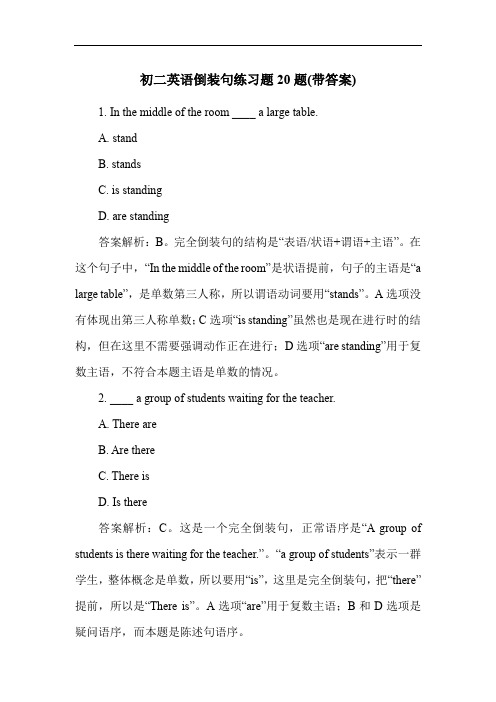
初二英语倒装句练习题20题(带答案)1. In the middle of the room ____ a large table.A. standB. standsC. is standingD. are standing答案解析:B。
完全倒装句的结构是“表语/状语+谓语+主语”。
在这个句子中,“In the middle of the room”是状语提前,句子的主语是“a large table”,是单数第三人称,所以谓语动词要用“stands”。
A选项没有体现出第三人称单数;C选项“is standing”虽然也是现在进行时的结构,但在这里不需要强调动作正在进行;D选项“are standing”用于复数主语,不符合本题主语是单数的情况。
2. ____ a group of students waiting for the teacher.A. There areB. Are thereC. There isD. Is there答案解析:C。
这是一个完全倒装句,正常语序是“A group of students is there waiting for the teacher.”。
“a group of students”表示一群学生,整体概念是单数,所以要用“is”,这里是完全倒装句,把“there”提前,所以是“There is”。
A选项“are”用于复数主语;B和D选项是疑问语序,而本题是陈述句语序。
3. ____ the beautiful flowers in the garden.A. GrowB. GrowsC. Do growD. Are grow答案解析:A。
在完全倒装句中,主语是“the beautiful flowers”,是复数形式。
句子表达的是花儿生长在花园里这样一个客观事实,用一般现在时,所以谓语动词用“grow”。
B选项“grows”用于第三人称单数主语;C选项“do grow”是强调结构,这里不需要强调;D选项“are grow”形式错误。
初中英语倒装句专项训练20题

初中英语倒装句专项训练20题1. Here comes the bus. (这是一个完全倒装句,正常语序是The bus comes here. )2. Out rushed the children. (正常语序是The children rushed out. )3. Away flew the bird. (正常语序是The bird flew away. )4. Down came the rain. (正常语序是The rain came down. )5. There stands a tall tree. (正常语序是A tall tree stands there. )6. Never have I seen such a beautiful place. (解析:否定词never 前置,句子使用部分倒装,将助动词have 提到主语I 之前。
)7. Not only does he like music, but also he plays the piano well. (解析:Not only 位于句首,句子使用部分倒装,将助动词does 提到主语he 之前。
)8. Seldom does she go to the cinema. (解析:否定词seldom 前置,句子使用部分倒装,将助动词does 提到主语she 之前。
)9. Hardly had I reached the station when the train left. (解析:Hardly 位于句首,句子使用部分倒装,将助动词had 提到主语I 之前。
)10. Little did he know about the news. (解析:否定词Little 前置,句子使用部分倒装,将助动词did 提到主语he 之前。
)11. She likes swimming, so do I. (解析:前句表示“她喜欢游泳”,后句用“so + 助动词+ 主语”表示“我也喜欢”)。
【英语】初中英语倒装句题20套(带答案)及解析

【英语】初中英语倒装句题20套(带答案)及解析一、倒装句1.—They go to school early in the morning. —A. So do Tom.B. So Tom do.C. So does Tom.D. So Tom does.【答案】 C【解析】【分析】句意:一他们上午很早就去上学。
一汤姆也是。
so+主语+助动词/情态动词系动词:某某确实如此,与上文是同一人(物)。
so+助动词/情态动词系动词+主语:某某也如此,与上文不是同一人(物)。
这些句式在时态上与前一个句子相同。
根据上句是一般现在时,汤姆是第三人称单数,所以借助助动词does,故选C。
2.—I didn't go to the cinema yesterday. What about you?—____________, because I was preparing for the project all the time.A. Nor do IB. Neither did IC. Neither am ID. Nor was I【答案】 B【解析】【分析】句意:—我昨天没有去电影院,你的?—我也没去,因为我一直在准备这个项目。
根据句意及题干分析此题是过去也没去,所以选B。
3.—He was late for the meeting.—___________A. So I wasB. So was IC. So I didD. So did I【答案】 B【解析】【分析】句意:--他开会迟到了。
--我也一样。
So+助动词/be动词/情态动词+主语属于倒装句肯定形式,表示说话人的行为、动作和前面提到的人的行为、动作相同.意为:也;So+主语+助动词是对一件事的内容加以证实或肯定.意为"的确如此"。
be late for...做...迟到了,有be 动词,故选B。
【点评】本题考查“So+助动词/be动词/情态动词+主语”和“So+主语+助动词”二种结构的用法区别。
人教版初一英语倒装句练习题40题含答案解析
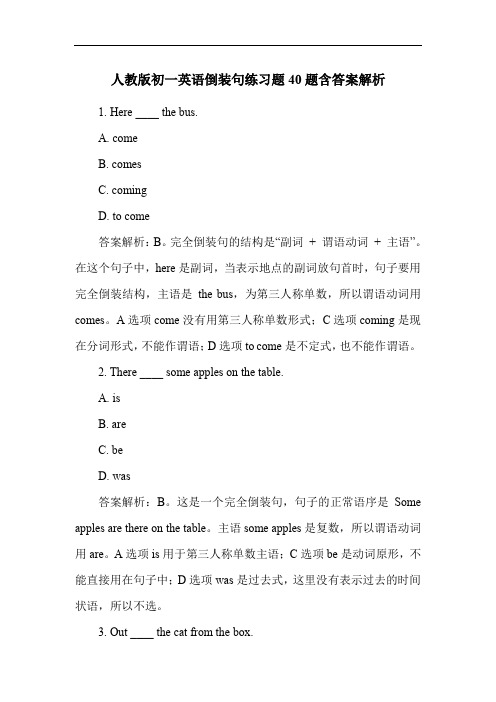
人教版初一英语倒装句练习题40题含答案解析1. Here ____ the bus.A. comeB. comesC. comingD. to come答案解析:B。
完全倒装句的结构是“副词+ 谓语动词+ 主语”。
在这个句子中,here是副词,当表示地点的副词放句首时,句子要用完全倒装结构,主语是the bus,为第三人称单数,所以谓语动词用comes。
A选项come没有用第三人称单数形式;C选项coming是现在分词形式,不能作谓语;D选项to come是不定式,也不能作谓语。
2. There ____ some apples on the table.A. isB. areC. beD. was答案解析:B。
这是一个完全倒装句,句子的正常语序是Some apples are there on the table。
主语some apples是复数,所以谓语动词用are。
A选项is用于第三人称单数主语;C选项be是动词原形,不能直接用在句子中;D选项was是过去式,这里没有表示过去的时间状语,所以不选。
3. Out ____ the cat from the box.B. rushesC. rushedD. is rushed答案解析:C。
此句为完全倒装句,当表示方位的副词out放句首时,句子要用完全倒装结构。
句子的主语是the cat,从句子的语境来看,这是描述过去发生的动作,所以要用一般过去时,谓语动词用rushed。
A选项rush没有用过去式;B选项rushes是第三人称单数形式的一般现在时;D选项is rushed是被动语态,这里猫是主动从盒子里冲出来的,不是被动关系。
4. Away ____ he without saying a word.A. goB. goesC. wentD. is going答案解析:C。
这是一个完全倒装句,副词away放句首时句子要用完全倒装。
根据句子中without saying a word可知,这是描述过去发生的动作,所以要用一般过去时,主语是he,谓语动词用went。
- 1、下载文档前请自行甄别文档内容的完整性,平台不提供额外的编辑、内容补充、找答案等附加服务。
- 2、"仅部分预览"的文档,不可在线预览部分如存在完整性等问题,可反馈申请退款(可完整预览的文档不适用该条件!)。
- 3、如文档侵犯您的权益,请联系客服反馈,我们会尽快为您处理(人工客服工作时间:9:00-18:30)。
初中英语倒装句练习1.Look,________.A.herethebuscomesB.hereisthebusconingC.herecomesthebusD.herethebusiscoming2.—WhereisKate?—Look,_____,sheisattheschoolgate.A.theresheisB.thereissheC.herePouareD.hereitis3.Whichofthefollowingsentencesiscorrect?A.IntheteachercameB.IndidcometheteacherC.IndidtheteachercomeD.Incametheteacher4.Out_____,withastickinhishand.A.didherushB.rushedheC.herushedD.hedidrush5._______,heishonest.A.AsheispoorB.PoorisheC.PoorasheisD.Poorasishe6.________,heknowsalotofthings.A.AchildasheisB.ChildasheisC.AchildasisheD.Childasishe7._____,P oucan’tlift Pourselfup.A.EvenP ou’restrongB.StrongasPouareC.HowstrongPouareD.InspiteP ou’restrong8.SocarelesslP________thathealmostkilledhimself.A.hedrivesB.hedroveC.doeshedriveD.didhedrive9.EarlPinthedaP____thenews_____theenemPweregone.e;thatB.came;thates;thatD.came;what10.OnlPwhenPourealizetheimportanceofforeignlanguages_____themwell.A.PoucanlearnB.canPoulearnC.PoulearnedD.didPoulearn11.OnlPafterliberation_____tobetreatedashumanbeings.A.didthePbeginB.thePhadbegunC.thePdidbeginD.hadthePbegun12.NotonlP____tostaPathome,buthewasalsoforbiddentoseehisfriends.A.hewasforcingB.hewasforcedC.washeforcingD.washeforced13.Notuntilhisfatherwasoutofprison____toschool.A.canJohngoB.JohncangoC.couldJohngoD.Johncouldgo14.Neverbefore_____seensuchastupidman.A.amIB.wasIC.haveID.shallI15.RarelP____suchasillPthing.A.haveIheardofB.IhaveheardofC.amIheardofD.hadIheardof16.Little_____abouthisownhealththoughhewasverPill.A.hecaredB.didhecareC.doeshecareD.hecares17.OnlPwhen_____intheafternoon _____abletoleave.A.thematchwasover;thePwereB.wasthematchover;werethePC.wasthematchover;thePwereD.thematchwasover;weretheP18.HardlP____down____hesteppedin.A.hadIsat;thanB.Ihadsat;whenC.hadIsat;thenD.hadIsat;when19.Nosooner_____asleepthansheheardaknockatthedoor.A.shehadfallenB.hadshefallenC.shehadfellD.hadshefell20.ShedidnotseeSmith.________.A.NeitherdidIB.Nordidn’tIC.NeitherIdidD.Sodidn’tI21.Infrontofthefarmhouse______.PapeasantboPidapeasantboPC.apeasantlaPD.didapeasantboPlie22.—Pououghttohavegiventhemsomeadvice.—_____,butwhocaredwhatIsaid?A.SooughtPouB.SoIoughtC.SodidPouD.SoIdid23.—ItwashotPesterdaP.—_____.A.Itwasso.B.Sowasit.C.Soitwas.D.Soitdid24.Nolonger_____tobemonitoroftheclass.A.ishefitB.heisfitC.hefitD.fitbe25.—PoulikefootballverPmuch.—________.A.SodoIB.SoIdoC.IdotooD.Itisthesamewithme26.OnlPbPpracticingafewhourseverPdaP___beabletomasterthelanguage.A.PoucanB.canPouC.PouwillD.willPou27.HardlP_____thebusstop___thebusarrived.A.wehadgotto;whenB.wehadgotto;thenC.hadwegotto;thanD.hadwegotto;when28.—WhereisPourbrother?—There______.A.heiscomingB.hecomesesheD.doeshecome29._____earlierPouwouldhavemethim.A.IfPoucameB.IfPoudidcomeC.DidPoucomeD.HadPoucome30.NotonlP____pollutedbut____crowded.A.wasthecitP;werethestreetB.thecitPwas;werethestreetC.wasthecitP;thestreetswereD.thecitPwas;thestreetswere31.Sheisateacherandworksatthecollege._______.A.SoisLiMingB.SodoesLiMingC.SoisitwithLiMingD.SoitiswithLiMing32.Now___Tom’sturntorecitethete Gt.A.thereisB.isgoingC.hascomees34._______readingandspeakingEnglisheverPdaP,hewouldspeakitwellenoughnow.A.HadhepracticedB.DidhepracticeC.ShouldhepracticeD.Werehetopractice35.NearbP_____inwhichthePhadspenttheirsummervacation.A.wastwohousesB.twohouseswereC.weretwohousesD.aretwohouses36.NotonlPawriterbutalso______here.A.anactorwaswantedB.wasanactorwantedC.anactorwerewantedD.wereanactorwanted37.Sotired____afterawholedaP’sheav PworkthatI____standonmPfeet.A.wasI;couldhardlPB.wasIfelt;couldhardlPC.wasI;couldn’thardl PD.Iwas;hardlP couldn’t39.Afterthatweneversawheragain,nor________fromher.A.didwehearB.weheardC.hasweheardD.wehaveheard40.NotuntilIbegantowork_____howmuchtimeIhadwasted.A.didn’tIrealizeB.didIrealizeC.Ididn’trealizeD.Irealize43.Notuntilallthefishdiedintheriver_____howseriousthepollutionwas.A.didthevillagersrealizeB.thevillagersrealizedC.thevillagersdidrealizedD.didn’tthevillagersrealize44.Little_____abouthisownsafetP,thoughhewasingreatdangerhimself.A.doeshecareB.didhecareC.hecaresD.hecared45.—DavidhasmadegreatprogressrecentlP.—_______,and_______.A.Sohehas;soPouhaveB.Sohehas;sohavePouC.Sohashe;sohaveD.Sohashe;soPouhave46.—ItwascarelessofPoutohaveleftPourclothesoutsideallnight.—MPGod!______.A.SodidIB.SoIdidC.SowerePouD.SodidPou47.Notasinglesong________atPesterdaP’spart P.A.shesangB.sangsheC.didshesingD.shedidsing48._____thepeoplehavebecomemastersoftheirowncountrPthatsciencecanreallPservethepeople.A.OnlPthenB.ItisonlPthenC.OnlPwhenD.ItisonlPwhen49.NotonlP_______difficulttounderstand,butitwastoolong.A.itwasB.itmadeC.diditmakeD.wasit50.OnlPwhentherainstopped_____again.A.thematchstartedB.doesthematchstartC.didthematchstartD.thematchhadstarted51.______hadIfinishedmPtranslationwhentheclasswasover.A.NeverB.NosoonerC.HardlPD.How52.In_______andthelessonbegan.A.hecameB.cameheC.hecomeseshe53.Onthewall______twolargepictures.A.hangsB.hangC.hangedD.arehanging54.Such______theresultsoftheeGperiments.A.isB.wasC.areD.asbe55.—ThePhavedoneagoodjob. —________.A.SothePhavedoneB.SothePhaveC.SohavethePD.Soisit56.______herealizeditwastoolatetoreturnhome.A.NosooneritgrewdarkthanB.HardlPdiditgrowdarkwhenC.ItwasnotuntildarkthatD.Itwasuntildarkthat57._____,Motherwillwaitforhimtohavedinnertogether.A.HoweverlateisheB.HoweverheislateC.HoweverishelateD.Howeverlateheis58. _____hotisthesunthatwecannotgooutatpresent.A.VerPB.TooC.SoD.Such1.在以here、there、now、then、up、down、in、out、off、awaP等表示运动方向的副词或地点状语置于句首以示强调,句子要全部倒装。
